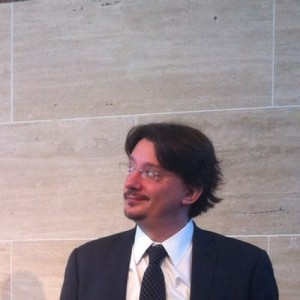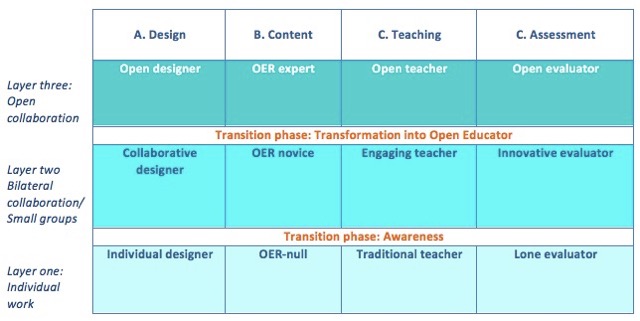the Open Educators Factory (OEF) project
This post introduces the Open Educators Factory (OEF) project, a research effort aiming to explore how to transform university teachers from “agents of resistance” into “agents of change” for openness in education. The project, led by Fabio Nascimbeni, is funded by the Universidad Internacional de la Rioja (UNIR) and is part of the work of the TELSOCK Research Team within UNIR Research.
The starting assumption of the project is that true progress in terms of openness in higher education (as well as in other educational sectors) requires a major cultural change in the mindset of all stakeholders from public policy makers to institutional leaders, to teachers and researchers, to students and parents. As rightly stated by the recent report Foundations for OER Strategy Development it is fundamental to work on the OER Ecosystem in order to successfully develop sustainable strategies for openness in education. Within this ecosystem, the OEF project believes that the cornerstones for change to happen are educators. University educators (meant as professors, lecturers and tutors) represent in fact the biggest “resistance” to the Open Education revolution – mainly because they typically fear that their role might be undermined by open approaches and because they do not have a full understanding of the potential of Open Education – and at the same time they are the ones that could contribute the most to the adoption of Open Education practices from a genuine bottom up perspective.
Following a phase of literature review and a number of interviews(1), the project has developed an original definition of Open Educator, aiming to help decision makers at different institutional and policy levels as well as the HE teaching population to have a clear “development target” towards which to work. Interestingly, while definitions of OER and Open Education are abundant in scientific literature as well as in practice, a definition that encompasses openness within all dimensions of teachers’ activities does not seem to exist: literature seems in fact to be focusing mostly on the “objects” of Open Education, namely Open Educational Resources and more recently MOOCs, or on its “practices”, such as Open Educational Practices, Open Pedagogy, Open Design, Open Scholarship. To fill this gap, we have worked out a definition which takes into account both the “objects” (teaching content and tools) and the practices (learning design, pedagogical and assessment approaches) of teachers’ activities.
Our definition of the Open Educator is the following:
—-
An Open Educator is a teacher/lecturer/tutor who choses to use open approaches, when possible and appropriate, with the aim to remove all unnecessary barriers to learning. She/he works through an open online identity and relies on online social networking to enrich and implement his/her work, understanding that collaboration bears a responsibility towards the work of others.
An Open Educator implements openness by working across four activity areas. He/she:
- Implements Open Learning Design, by openly sharing ideas and plans about her/his teaching activities with experts and with past and potential students, incorporating inputs and critics and transparently leaving a trace of the development process.
- Uses open educational content, by releasing his/her teaching resources through open licenses, by facilitating sharing of his/her resources through OER repositories and other means, and by adapting, assembling and using OERs produced by others in his/her teaching.
- Adopts Open Pedagogies, fostering co-creation of knowledge by students through online and offline collaboration, allowing learners to contribute to public knowledge resources such as Wikipedia.
- Adopts open assessment practices such as peer assessment, open badges or e-portfolios.
Starting from the four areas presented in the definition, we have developed a framework for teachers self-assessment and professional development, where the columns represent the four areas of activity of our Open Educator definition (learning design, content, teaching and assessment), and the rows indicate – with a necessary degree of generalisation – the different typologies of educators with respect to openness within each activity area. Starting from the bottom, for each column we have defined three levels of openness that an educator typically reaches once she/he goes through some transition phases that are transversal to all four components. The first transition phase has to do with being aware of open approaches, and represents still today the main obstacle for the teaching populations to opt for openness, while the second transition phase deals with becoming “fluent” with openness: once gone though this transition, an educator is expected to adopt open approaches as default in her/his work.
The definition and the framework are fully open for critics and suggestions: specifically until the end of February 2015 we are seeking contributions and comments to validate the work before starting with the pilot phase, when the framework will be tested in a number of universities. Please comment directly on the project wiki or by contacting fabio.nascimbeni@unir.net.
(1): We would like to thank the experts who have contributed to the above work through interviews: Martin Weller, The Open University, UK; Wayne Mackintosh, OER-F, New Zealand; Rory McGreal, Athabasca University, Canada; Chrissi Nerantzi, Manchester Metropolitan University, UK; Antonio Texeira, Universidade Aberta de Portugal, Portugal; and Daniel Burgos, Universidad Internacional de la Rioja, Spain.
—
About the author:
 Fabio Nascimbeni works as assistant professor in the International University of La Rioja, and is a postdoctoral fellow at the University of Sao Paulo (USP), where he collaborates with the CEST – Centro de Estudos sobre Tecnologia e Sociedade. He is a member of the Executive Committee of the European Distance and eLearning Network (EDEN), of the Editorial Board of the EURODL Journal, as well as of a number of Scientific Committees in the field of learning innovation. He has been active in the field of innovation and ICT for learning since 1998, by designing and coordinating more than 40 research and innovation projects in Europe, Latin America and the Caribbean, and Asia. His main research interests are open education, learning innovation, e-learning, digital literacy, social and digital inclusion, social networking.
Fabio Nascimbeni works as assistant professor in the International University of La Rioja, and is a postdoctoral fellow at the University of Sao Paulo (USP), where he collaborates with the CEST – Centro de Estudos sobre Tecnologia e Sociedade. He is a member of the Executive Committee of the European Distance and eLearning Network (EDEN), of the Editorial Board of the EURODL Journal, as well as of a number of Scientific Committees in the field of learning innovation. He has been active in the field of innovation and ICT for learning since 1998, by designing and coordinating more than 40 research and innovation projects in Europe, Latin America and the Caribbean, and Asia. His main research interests are open education, learning innovation, e-learning, digital literacy, social and digital inclusion, social networking.
 Open Education Working Group
Open Education Working Group 




Leave a Reply